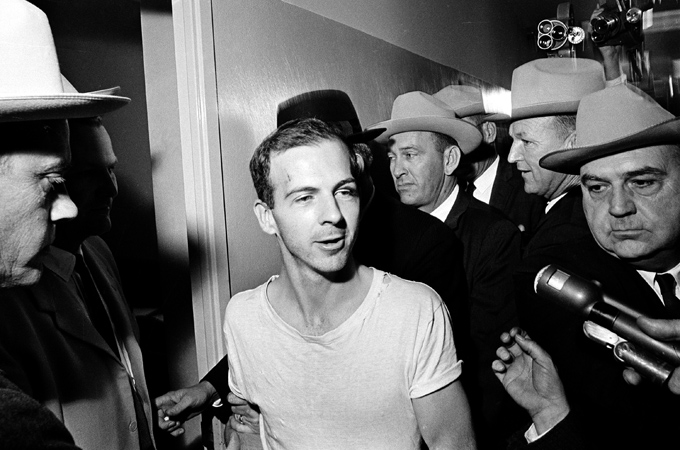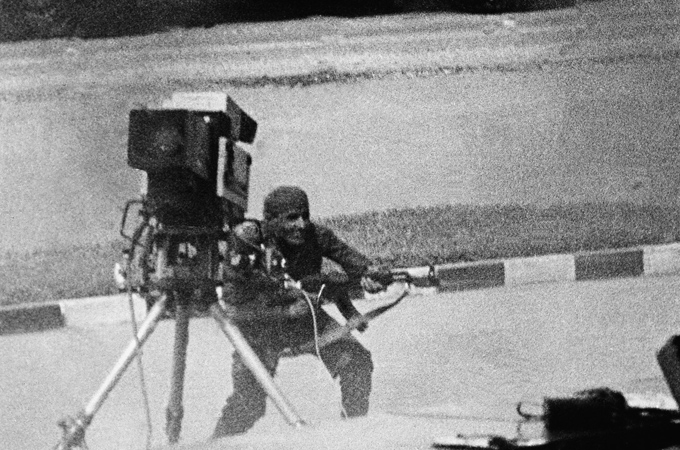JFK’s death and Middle East assassinations
A look at the long history of political murder in the Middle East on the 50th anniversary of Kennedy’s killing.

Beirut, Lebanon – He was the young, charismatic US president who took his nation by storm, only to be cut down in his prime by the determined actions of a lone gunman – or, as many would believe, the efforts of a wider conspiracy.
That man was John Fitzgerald Kennedy – otherwise known as JFK – and Friday marks 50 years since he was gunned down in his open-topped car as he travelled in a motorcade through the streets of Dallas, Texas.
His death not only paved the way for Lyndon B Johnson, JFK’s vice-president, to unexpectedly become the 36th commander-in-chief of the United States, but also sparked a litany of conspiracy theories that continue to resonate a full half-century later.
 |
| Lee Harvey Oswald denied involvement in the Kennedy assassination, and was himself later shot dead [AP] |
As JFK’s assassination anniversary sets off another round of claims and counter-claims over the circumstances of his demise, many in the Middle East will perhaps lament their own political dead, a list that surely overshadows the four sitting American presidents and other high-profile figures of power in the US who met an untimely death at the hands of an assassin.
The bloody realms of the Middle East’s most infamous assassinations have laid the fate of the region itself. Egypt, Jordan, Israel and, in too many cases, Lebanon have all played host to shocking political murders that, like the killing of JFK, shook the surrounding region – and even the world.
“The assassination of Egyptian Hassan al-Banna, the founder of the Muslim Brotherhood, in February 1949, engendered a struggle between Islamists and the state and in many ways continues to impact Egypt’s political landscape,” says Maurice Jr Labelle, a visiting scholar at the University of Saskatchewan’s department of history.
Lebanon has always been a nest of vipers given the consociational democracy system that has been followed there. Coupled on this modern veneer of a republic, you have ancient bitter oriental clans with their eastern Mediterranean rivalries pitted against each other and where alliances are but fleeting.
“Banna’s ‘martyrdom’ continues to serve as spiritual and political motivation for various Islamist movements and their struggles against secular regimes – whether in Egypt, the Arab world, the ummah or the world itself. The ongoing conflict between the Brotherhood and the state is an important theme in Egyptian history and contemporary politics, as evidenced by the recent demonstration in support of former Egyptian president Mohammed Morsi.”
Taking down leaders
For many analysts, the violent deaths of Egypt’s president Anwar Sadat in 1981 and Lebanon’s five-time premier Rafik Hariri in 2005 – arguably two of the most prominent Middle Eastern statesmen of recent times – are the closest regional comparisons to the bloody assassination of JFK himself.
“Sadat’s and Hariri’s assassinations are the obvious ones in terms of important local and regional impact,” says Karim Makdisi, associate professor of political studies and public administration at the American University of Beirut.
“Sadat’s death reflected regional popular discontent towards elite-driven compromise politics with Israel and the US. Hariri’s death is more important as a prism through which the US and its regional allies – Saudi Arabia and Israel, in particular, but France and the UK, too – prosecuted its ‘war on terror’ in the region and their battle against the Iran axis; and cemented the tactical move towards a Sunni-Shia split.”
While both men were political giants whose deaths sent shockwaves through the Middle East – Hariri’s demise led to the Cedar Revolution that was successful in ending Syria’s decades-long hegemony over Lebanon – neither, Makdisi tells Al Jazeera, possessed the kind of standing that caused the worldwide mourning that followed JFK’s untimely death.
“Neither of these two leaders had the kind of status that JFK had in US terms,” explains Makdisi. “Sadat was unpopular and there was not much remorse – unlike in JFK’s case – while Hariri enjoyed JFK-like status, but only among his core supporters, not on a national or regional basis.”
Too often forgotten, but just as significant, are those assassinations that have taken place in Iran.
 |
| An assassin opens fire on president Anwar Sadat on October 6, 1981 in Cairo, Egypt [AP] |
A huge bomb explosion in the Islamic Republican Party’s headquarters on June 28, 1981 – just two years after the Islamic Revolution saw the fall of the shah – killed scores of prominent ministers and parliamentarians. Two months later, another bomb ripped through the office of prime minister Mohammad-Javad Bahonar, killing him and the newly elected president Mohammad Ali Rajaie.
“That June 1981 assassination was very infamous in that it removed so many members of the Islamic Republican Party,” says Burzine K Waghmar, a senior teaching fellow at SOAS, University of London, and a member of the London Middle East Institute.
“The Mujahedin-e-Khalq Organisation [MEK], among other organisations, was held responsible. Following that assassination [at the headquarters], the Revolutionary Guard and the regime really came down heavy, and from that day to this in 2013, we’ve seen, in more ways than one, a police state: they dug their heels in and made it known that ‘we’re here to stay and this is our Islamic Revolution and republic’.”
‘Nest of vipers’
Since it gained independence from France in 1943, Lebanon has been particularly plagued by assassinations – with many remaining unsolved. Waghmar contends that such a grim record has its roots in the country’s political system, which has rarely facilitated the necessary means to deliver justice.
In all this, elite politicians and notables in the region have regularly served as the lubricant and beneficiaries of external political and economic hegemony, as well as the tool for suppression of popular revolts, movements, resistances and ideas.
“Lebanon has always been a nest of vipers, given the consociational democracy system that has been followed there,” he tells Al Jazeera. “Coupled on this modern veneer of a republic, you have ancient bitter oriental clans with their eastern Mediterranean rivalries pitted against each other and where alliances are but fleeting.
“And, you find the most bizarre sorts, which only gives credence to the assertion that politics makes for strange bedfellows, and, if anything, Lebanon vindicates that… It’s like Sicily on the shores of Beirut.”
While the Middle East has been shaped by its litany of high-profile assassinations in recent years – the murder of Israel’s Yitzhak Rabin in 1995 and the startling new evidence surrounding Yasser Arafat’s demise in 2004 are further examples – Labelle argues that “all political assassinations, whether in the United States or the Middle East, carry both short and long-term impacts, and I’m not sure if we can accord greater importance to those that are associated with Middle Eastern politics per se“.
Makdisi, too, adds that while political deaths in the Middle East have been many and bloody, such murders are not the gravest of ills to have been inflicted upon this restive region.
“That I reserve for the colonial betrayals, division of territories, and institutionalising of sectarian identities in the region on one hand, and the presence of huge oil and natural gas reserves and Israel on the other hand,” says Makdisi.
“In all this, elite politicians and notables in the region have regularly served as the lubricant and beneficiaries of external political and economic hegemony, as well as the tool for suppression of popular revolts, movements, resistances and ideas. Political assassinations in this context are usually reflections of elite rivalry, foreign intrigue and, in some cases, popular discontent with craven political leaders.”
Follow Alasdair on Twitter: @AlasdairSoussi
Al Jazeera America is running a special series of features marking the 50th anniversary of the death of John F Kennedy. Check it out, here.